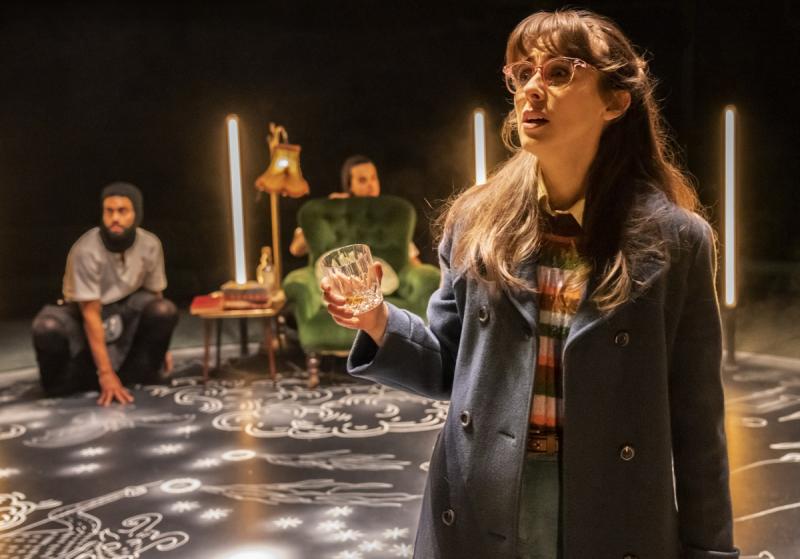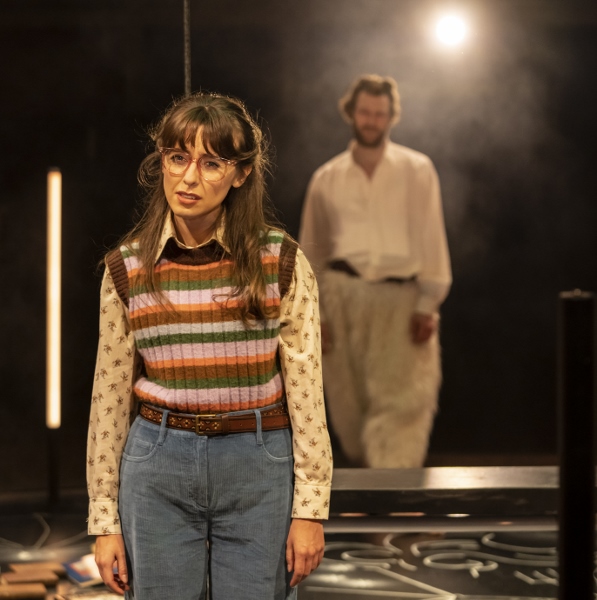The Strange Undoing of Prudencia Hart, Royal Exchange, Manchester review - a spooky study in balladry | reviews, news & interviews
The Strange Undoing of Prudencia Hart, Royal Exchange, Manchester review - a spooky study in balladry
The Strange Undoing of Prudencia Hart, Royal Exchange, Manchester review - a spooky study in balladry
Gentle spoofing turns to something much more earthy and traditional

This is a story of an innocent who finds herself unexpectedly in a strange, unknown world. The same could be true for those in its audience.
Scottish academia sets great store by the significance of folk tradition, and many are the books and papers on every aspect of the subject. It’s this that forms the background to The Strange Undoing of Prudencia Hart – the study of balladry, in particular – and a little gentle spoofing of that academic oeuvre gives the show its kick-off point.
This may come as a bit of a surprise to those who don’t inhabit its world. It certainly did to me when I once started looking up a violinist called James Scott Skinner, or “The Strathspey King”, who first learned his music in Manchester from one of Charles Hallé’s orchestra members and finished up as a violin and dance teacher to Queen Victoria’s vast Balmoral household – there’s reams of stuff about him.
This, though, is about more recent "folk studies" topics. It began in 2006 as an idea that came to writer David Greig and creative Wils Wilson, and found its first incarnation with the National Theatre of Scotland in the Victorian Bar of the Tron Theatre, Glasgow in 2011.
 The first act pokes plenty of fun at an only slightly imaginary kind of scholarly endeavour which those who know its real world equivalent will chuckle at a-plenty. A symposium on “The Linguistics and Transmission of Oral Narratives and Balladry: Border Ballads – Neither Border nor Ballad?” is the less-than-wholly-grammatical title of an event where young PhD graduate Prudencia Hart (Joanne Thomson) finds herself, in Kelso, along with various other specialists, determined to impress with their sociological, geographical and other kinds of expertise.
The first act pokes plenty of fun at an only slightly imaginary kind of scholarly endeavour which those who know its real world equivalent will chuckle at a-plenty. A symposium on “The Linguistics and Transmission of Oral Narratives and Balladry: Border Ballads – Neither Border nor Ballad?” is the less-than-wholly-grammatical title of an event where young PhD graduate Prudencia Hart (Joanne Thomson) finds herself, in Kelso, along with various other specialists, determined to impress with their sociological, geographical and other kinds of expertise.
She, though, is more rooted in reality than most, and asks the clever meme-spinners why they don’t believe in beauty any more, and whether it would be better for meanings still to be attached to words.
Underneath we are seeing the beginning of a tale which goes beyond clever referencing, as she and a colleague book into a Kelso B&B and set off for a folk night in a pub, which, after last orders and imbibing of whisky, develops into something much more earthy and traditional. It’s winter solstice and the night of The Devil’s Ceilidh, so it's not so surprising when this play's Satan (Paul Tinto, pictured above with Lawrence Hodgson-Mullings and Amelia Isaac Jones) shows up in person.
Staggering into the snowy night (well, there’s a sprinkling of white stuff from above the acting area), Prudencia loses her way and is invited into what she thinks is the B&B… only it isn’t. In a switch that mimics the multiple stories of the old ballads, we realise she’s now to be a guest of the Devil himself. End of Act One.
Debbie Hannan’s production, with just five actors plus musical director Malin Lewis sharing all roles, has some challenges to meet in bringing this to life on the circular acting space of the Royal Exchange Theatre. The pub scene (which returns at the end) must have been pretty real in the original production where everyone sat at tables and got into the spirit of the thing: it’s harder with social distancing of actors from audience, and the hard-working cast cannot always make their songs or even their spoken lines particularly clear.
 In Act Two, Prudencia is the Devil’s guest, and here designer Max Johns has gone to some length to evoke his hellish dwelling. The music (Michael John McCarthy is composer, arranger and sound designer) helps create atmosphere beyond that of the ceilidh-style songs of the first part. Those few who left the theatre at the interval missed the best part of the evening, where we learn that staying with Old Nick is rather like being in "I’m A Celebrity Get Me Out Of Here" (“I sold them the format”), and that Prudencia is getting fond of him – “it happens in ballads”. I won’t spoil the suspense by telling any more of the story.
In Act Two, Prudencia is the Devil’s guest, and here designer Max Johns has gone to some length to evoke his hellish dwelling. The music (Michael John McCarthy is composer, arranger and sound designer) helps create atmosphere beyond that of the ceilidh-style songs of the first part. Those few who left the theatre at the interval missed the best part of the evening, where we learn that staying with Old Nick is rather like being in "I’m A Celebrity Get Me Out Of Here" (“I sold them the format”), and that Prudencia is getting fond of him – “it happens in ballads”. I won’t spoil the suspense by telling any more of the story.
In fact, the whole show is like what happens in ballads: it’s largely written in rhyming couplets (how about a line ending “tit under bum” rhymed with the next’s “quod erat demonstrandum”?) and conveys the sort of spooky world, mixing the ordinary and the mysterious, that the old ballads tell of.
The outstanding quality of this performance is Thomson (pictured above, with Paul Tinto) in the title role. She’s human, real, feisty, sympathetic and an all-round good egg. In fact the narrative doesn’t come across as her undoing so much as her triumph over the odds. I liked the costume design, keeping the whole thing slightly in the past, as the text’s mentions of newfangled things like mobile phones and Facebook remind you that the show has been around a while. It’s a somewhat strange choice for a Christmas run in Manchester (though the cast have a go at making people from its various localities feel at home in its Scottish world, and in a couple of cases use North of England rather than Scots intonations), but should be much appreciated by those of the Hibernian diaspora, the academic community, and anyone with a liking for folk “traditions” in pubs.
rating
Explore topics
Share this article
The future of Arts Journalism
You can stop theartsdesk.com closing!
We urgently need financing to survive. Our fundraising drive has thus far raised £33,000 but we need to reach £100,000 or we will be forced to close. Please contribute here: https://gofund.me/c3f6033d
And if you can forward this information to anyone who might assist, we’d be grateful.

Subscribe to theartsdesk.com
Thank you for continuing to read our work on theartsdesk.com. For unlimited access to every article in its entirety, including our archive of more than 15,000 pieces, we're asking for £5 per month or £40 per year. We feel it's a very good deal, and hope you do too.
To take a subscription now simply click here.
And if you're looking for that extra gift for a friend or family member, why not treat them to a theartsdesk.com gift subscription?
more Theatre
 Fiddler on the Roof, Barbican review - lean, muscular delivery ensures that every emotion rings true
This transfer from Regent's Park Open Air Theatre sustains its magic
Fiddler on the Roof, Barbican review - lean, muscular delivery ensures that every emotion rings true
This transfer from Regent's Park Open Air Theatre sustains its magic
 In Praise of Love, Orange Tree Theatre review - subdued production of Rattigan's study of loving concealment
Unspoken emotion flows through this late work
In Praise of Love, Orange Tree Theatre review - subdued production of Rattigan's study of loving concealment
Unspoken emotion flows through this late work
 Letters from Max, Hampstead Theatre review - inventively staged tale of two friends fighting loss with poetry
Sarah Ruhl turns her bond with a student into a lesson in how to love
Letters from Max, Hampstead Theatre review - inventively staged tale of two friends fighting loss with poetry
Sarah Ruhl turns her bond with a student into a lesson in how to love
 Elephant, Menier Chocolate Factory review - subtle, humorous exploration of racial identity and music
Story of self-discovery through playing the piano resounds in Anoushka Lucas's solo show
Elephant, Menier Chocolate Factory review - subtle, humorous exploration of racial identity and music
Story of self-discovery through playing the piano resounds in Anoushka Lucas's solo show
 This is My Family, Southwark Playhouse - London debut of 2013 Sheffield hit is feeling its age
Relatable or stereotyped - that's for you to decide
This is My Family, Southwark Playhouse - London debut of 2013 Sheffield hit is feeling its age
Relatable or stereotyped - that's for you to decide
 The Frogs, Southwark Playhouse review - great songs save updated Aristophanes comedy
Tone never settles, but Sondheim's genius carries the day
The Frogs, Southwark Playhouse review - great songs save updated Aristophanes comedy
Tone never settles, but Sondheim's genius carries the day
 Mrs Warren's Profession, Garrick Theatre review - mother-daughter showdown keeps it in the family
Shaw's once-shocking play pairs Imelda Staunton with her real-life daughter
Mrs Warren's Profession, Garrick Theatre review - mother-daughter showdown keeps it in the family
Shaw's once-shocking play pairs Imelda Staunton with her real-life daughter
 The Crucible, Shakespeare's Globe review - stirring account of paranoia and prejudice
Ince's fidelity to the language allows every nuance to be exposed
The Crucible, Shakespeare's Globe review - stirring account of paranoia and prejudice
Ince's fidelity to the language allows every nuance to be exposed
 The Fifth Step, Soho Place review - wickedly funny two-hander about defeating alcoholism
David Ireland pits a sober AA sponsor against a livewire drinker, with engaging results
The Fifth Step, Soho Place review - wickedly funny two-hander about defeating alcoholism
David Ireland pits a sober AA sponsor against a livewire drinker, with engaging results
 The Deep Blue Sea, Theatre Royal Haymarket review - Tamsin Greig honours Terence Rattigan
The 1952 classic lives to see another day in notably name-heavy revival
The Deep Blue Sea, Theatre Royal Haymarket review - Tamsin Greig honours Terence Rattigan
The 1952 classic lives to see another day in notably name-heavy revival
 The Brightening Air, Old Vic review - Chekhov jostles Conor McPherson in writer-director's latest
The Irishman's first new play in over a decade is engaging but overstuffed
The Brightening Air, Old Vic review - Chekhov jostles Conor McPherson in writer-director's latest
The Irishman's first new play in over a decade is engaging but overstuffed
 1536, Almeida Theatre review - fast and furious portrayal of women in Henry VIII's England
This wild, intelligent play is a tour de force till the doom-laden finale
1536, Almeida Theatre review - fast and furious portrayal of women in Henry VIII's England
This wild, intelligent play is a tour de force till the doom-laden finale

Add comment